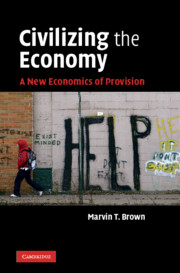Book contents
- Frontmatter
- Contents
- List of figures
- List of tables
- Preface
- 1 Introduction: creating a just and sustainable economy
- Part I Creating a new economic framework
- Part II The civic option
- 5 From property relations to civic relations
- 6 Society, civil society, and the market
- 7 Restoring reciprocity
- 8 Civic norms and market competition
- Part III A civic view of labor, land, and money
- Part IV Civilizing economic systems
- Part V A civic agenda
- Appendix: Free enterprise and the economics of slavery
- Bibliography
- Index
8 - Civic norms and market competition
Published online by Cambridge University Press: 05 June 2012
- Frontmatter
- Contents
- List of figures
- List of tables
- Preface
- 1 Introduction: creating a just and sustainable economy
- Part I Creating a new economic framework
- Part II The civic option
- 5 From property relations to civic relations
- 6 Society, civil society, and the market
- 7 Restoring reciprocity
- 8 Civic norms and market competition
- Part III A civic view of labor, land, and money
- Part IV Civilizing economic systems
- Part V A civic agenda
- Appendix: Free enterprise and the economics of slavery
- Bibliography
- Index
Summary
If we restore reciprocity as the foundation for market transactions, what will happen to competition? Is not competition the real source of energy that keeps the economic motor purring? Take it away and the whole business of business will grind to a halt. Like competitive sports, business thrives on the possibilities of winning and losing. Besides, it is how we sort out the best from the also-ran or even the quite good. If we establish an economics of provision rather than property, won't it need a healthy dose of competition to keep it humming? All this may be true, but what kind of competition belongs to market transactions: the competition on the battlefield, of the playground, or in the realm of ideas? As we shall see, competition in an economics of provision does not disappear. It just becomes civilized.
Although the moral value of competition has rarely been questioned in traditional economics, Frank H. Knight, one of the founders of the Chicago School of Economics, wrote a fascinating essay in 1923 on the ethics of competition. He pinpointed many of the concerns we still have today.
Knight explores the ethics of competition in the context of the following definition of economic activity: “Economic activity is at the same time a means of want-satisfaction, an agency for want-and-character formation, a field of creative self-expression, and a competitive sport.” Using this definition as a guide, he explores the moral meaning of each aspect of economic activity.
- Type
- Chapter
- Information
- Civilizing the EconomyA New Economics of Provision, pp. 96 - 106Publisher: Cambridge University PressPrint publication year: 2010



